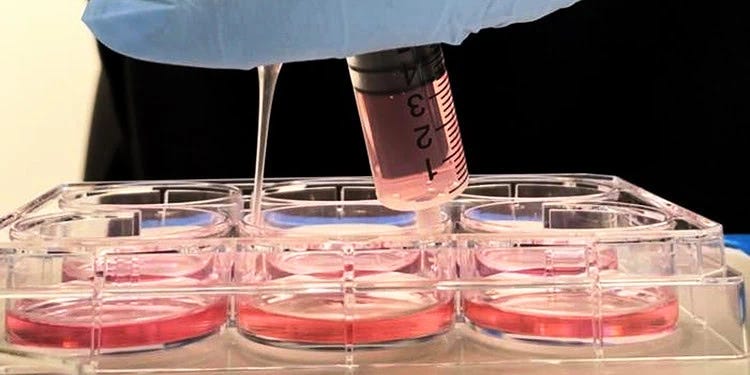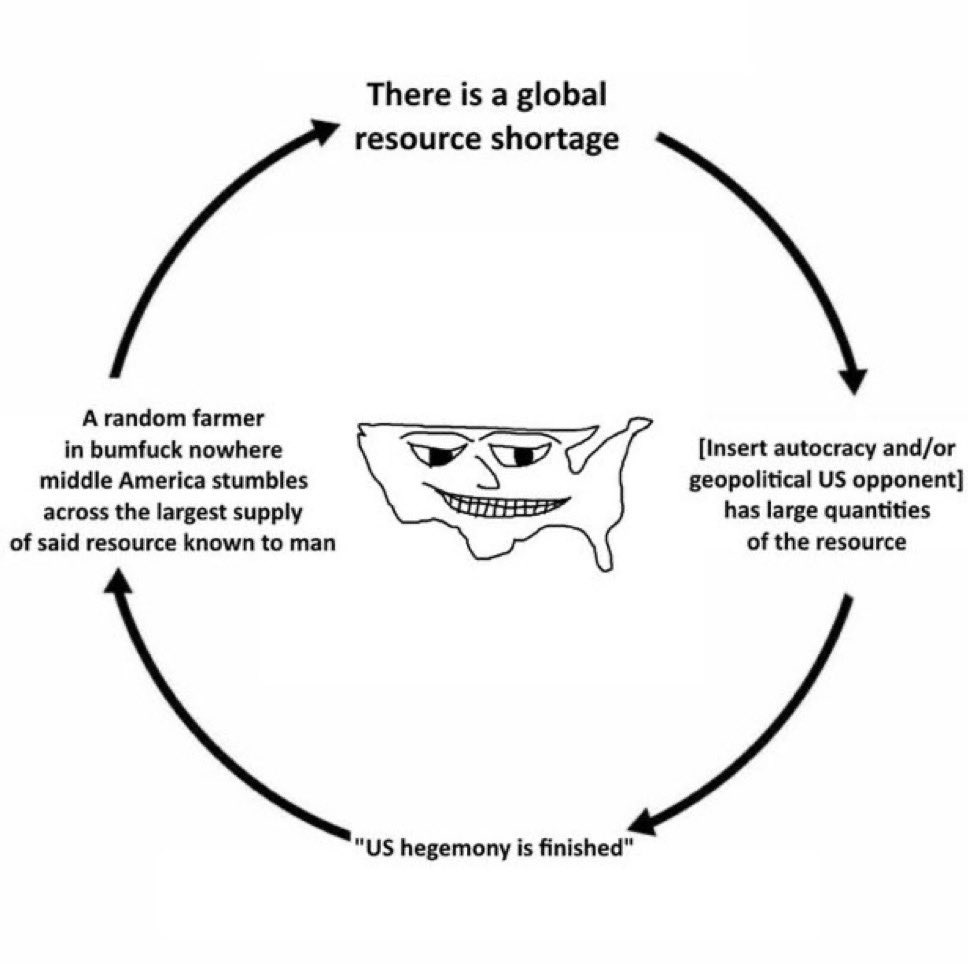Weekly Dose of Optimism #126
Sana Biotechnology, Memory Processes, METAGENE-1, McDermitt Caldera, More Speech, Enron Egg, Telepathy Tapes x Jesse Michels
Hi friends 👋,
Happy Friday and welcome back to our 126th Weekly Dose of Optimism and first edition of 2025. We’re heading into this year as optimistic as ever — AI continues to scale and provide real world value, it seems as if we’re on the cusp of multiple breakthroughs in clean energy, new treatments are introduced weekly to address all sorts of diseases and ailments, crypto appears to be crossing into the mainstream financial infrastructure, and there’s just been general vibe shift back towards common sense, ambition, and optimism. The magic is coming back.
At the same time, it’s been terribly sad to see the destruction in LA over the last couple of days. Lives are being sideswiped and uprooted, and being optimistic about the future is a lot easier when I am writing this from the comfort of my New York apartment with knowledge that my family and belongings are safe.
But LA will bounce back. That we’re certain of.
Let’s get to it.
Today’s Weekly Dose is brought to you by… Microfeller
Building a strong online presence is no longer just about having a website—it’s about creating a robust, fully-featured web platform. For startups looking to launch efficiently and at scale, Microfeller is the trusted partner of choice.
Microfeller delivers:
Custom, standout design that perfectly reflects your brand’s identity and values.
Modern, reliable engineering for seamless functionality.
Cost-efficient, resilient infrastructure that scales with your needs.
User-friendly content management systems your marketing team will love.
Advanced analytics tools for actionable insights.
Microfeller focuses on delivering high-quality projects quickly, designed specifically for Silicon Valley’s fast-growing startups. With a deep understanding of the pace of innovation, we help ensure your critical projects are completed on time and to your standards.
Clients trust Microfeller for rapid iterations and delivery timelines, clear, proactive communication, and consistently reliable results, even on the tightest schedules.
Partner with Microfeller to transform your vision into reality—on time, on budget, and ready to scale.
From Sana Biotechnology, Inc
Results of the study at four weeks after cell transplantation demonstrate the survival and function of pancreatic beta cells as measured by the presence of circulating C-peptide, a biomarker indicating that transplanted beta cells are producing insulin. C-peptide levels also increase with a mixed meal tolerance test (MMTT), consistent with insulin secretion in response to a meal.
Sana Biotechnology’s first-in-human study demonstrated that their hypoimmune (HIP) technology enables pancreatic islet cell transplantation in type 1 diabetes patients without the need for immunosuppression. This is a big deal because transplanted cells do not normally survive the body’s immune response, without immunosuppression.
In Type 1 diabetes, the body's immune system attacks and destroys cells that produce insulin (called beta cells). Currently, if you transplant new insulin-producing cells from a donor, patients need to take powerful drugs to suppress their immune system to prevent rejection. That’s clearly not ideal.
Sana has developed a way to modify donor insulin-producing cells (called HIP technology) so they can "hide" from the immune system.
The transplanted cells produced insulin, as evidenced by C-peptide levels, and avoided immune rejection, meaning the transplanted cells successfully functioned like natural insulin-producing beta cells. Further more, the cells properly transplanted without the need for potentially harmful immunosuppressive drugs.
This kind of cell transplant could completely change how we treat type 1 diabetes by offering a long-term solution without daily insulin shots or risky immune-suppressing drugs. Additionally, it shows that we might be able to transplant cells or organs without the body attacking them, which could transform how we treat all kinds of diseases.
Robert Nelsen, through whose tweet we heard about the result, summed up the potential poignantly: “In my 40 years of biotech, I was waiting to see this result. Never before have transplanted cells survived normal immune response without immunosuppression. Excited for patients, many whom I know see hope today for a possible cure for many diseases.”
On Halloween 2023, Elliot called cell-based therapies Medicine’s Endgame. With results like this, it’s easy to see how that may be the case.
(2) Neuroscientists just discovered memory processes in non-brain cells
From Eric W. Dolan in Psy Post via Orph
“So we knew that memory does not require all the complexity of the brain. It was a logical step to ask — does it require a brain at all?”
Speaking of cells… In November, a team of researchers at the NYU Center for Neural Science published a paper in Nature Communications titled The massed-spaced learning effect in non-neural human cells. We missed it.
Then last week, Psy Post published an article on the study with a slightly more direct title, which we finally discovered via a tweet from Orph quoting the article: “This finding suggests that memory mechanisms may stem from fundamental cellular processes” 🤯🤯.
The NYU researchers found that the same molecular machinery that helps our brains form memories exists in regular body cells too. When they exposed non-neural cells (including kidney cells) to repeated chemical signals, the cells showed "memory-like" responses eerily similar to how neurons behave during learning - responding better to spaced-out stimuli than cramming, just like we do when studying.
Lead researcher Nikolay Kukushkin suggests we might one day be able to "train" cells to perform beneficial behaviors, like teaching muscle cells to produce healthy hormones or programming cancer cells to stop dividing.
"To the cells of our body, anything that we do regularly — eating, exercising, taking medicine — is a pattern of chemicals in time," explains Kukushkin.
The discovery suggests memory isn't just a brain thing, but rather a fundamental feature of cellular biology that evolution figured out long before nervous systems existed.
While there are some differences, this work parallels the mind-bending work Dr. Michael Levin is doing on bioelectricity at Tufts, with both challenging the traditional neurocentric view of information processing. Both show that non-neural cells can process and store information. Both suggest "intelligence-like" behaviors exist at the cellular level. Both point to potential therapeutic applications by manipulating cellular behavior. Both challenge the idea that information processing is unique to the brain.
If Levin is showing how groups of cells can make decisions and maintain patterns, this work is showing how individual cells can "learn" from repeated experiences - different scales of the same fascinating phenomenon of non-neural intelligence.
For more on Levin’s work, check out this excellent recent interview.
(3) METAGENE-1: Metagenomic Foundation Model
From Prime Intellect
We are releasing a 7B parameter metagenomic foundation model designed for pandemic monitoring, trained on over 1.5T base pairs of DNA and RNA sequenced from wastewater.
You think AI is going to kill us?
Au contraire, mon frère!
It could save us from the next pandemic or large scale bioattack.
A research team from USC, Prime Intellect, and Nucleic Acid Observatory released METAGENE-1, a groundbreaking 7-billion-parameter AI model trained on 1.5 trillion DNA and RNA base pairs from human wastewater to improve pandemic monitoring and pathogen detection. In short, the model scans wastewater DNA to detect pathogens and predict health threats.
METAGENE-1 relies on metagenomic sequencing to process wastewater samples, which contain DNA and RNA fragments from thousands of organisms. This sequencing generates massive amounts of genomic data, capturing the diversity of microbial life in human waste. The model then converts these raw sequences into a structured format, so it can analyze short genomic fragments efficiently. From there, it can identify patterns and anomalies, enabling it to detect pathogens, track microbial changes, and predict emerging health trends.
Good shit.
(4) Massive Lithium Discovery Could Transform U.S. Energy Landscape
Haley Zaremba for OilPrice.com
A massive new lithium discovery on the border between Oregan and Nevada could supercharge the country’s white-gold rush. It is estimated that the newly discovered reserves under the ancient McDermitt Caldera holds a whopping 40 million metric tons of lithium. The scale of this deposit is extraordinary, “dwarfing other reserves worldwide.”
This graph, from Alec Stapp, pretty much sums up our analysis. Don’t know if we need to add much additional commentary here, but will fill in some of the details as to what happened.
A massive lithium deposit, estimated at 40 million metric tons — that’s 80 billion pounds — was discovered in the McDermitt Caldera on the Oregon-Nevada border a few years back. It’s the largest known lithium deposit in the world and it sits right here on U.S. of A soil. The deposit is believed to have formed due to volcanic activity and the subsequent evaporation of lithium-rich waters, concentrating the mineral in the caldera's sediments.
We actually covered this back in Weekly Dose #60, noting that even then, the story was a bit old, referencing a 2020 20-40 million ton estimate in Minerals. What’s changed is that we’re actually getting moving on this thing.
The Thacker Pass project, located within the caldera, is aiming to produce 40,000 metric tons of lithium annually starting in 2026. The Department of Energy and General Motors are supporting the $2 billion project.
For context, according to a Popular Mechanics report, the world will need 250,000 to 450,000 tonnes of lithium by 2030, but “In 2021, the world produced only 105—not 105,000—tonnes.”
The project is divinely times, with lithium demand soaring to meet the clean energy transition and our relationship with foreign lithium providers on increasingly shaky ground. Thank God, the US is blessed with an abundant supply of natural resources scattered throughout its “bumfuck nowheres.”
(5) More Speech and Fewer Mistakes
From Meta
Starting in the US, we are ending our third party fact-checking program and moving to a Community Notes model.
We will allow more speech by lifting restrictions on some topics that are part of mainstream discourse and focusing our enforcement on illegal and high-severity violations.
We will take a more personalized approach to political content, so that people who want to see more of it in their feeds can.
Zuck starting off the year quite based!
First, he announced that UFC CEO Dana White’s appointment to Meta’s board of directors. White is a prominent Trump ally and figure within the broader Rogan cinematic universe. He’ll bring some bold leadership and entertainment chops with him, and certainly a relatively heavy dose of anti-woke perspectives.
Zuck followed up this appointment with with a seemingly related update on Meta’s content moderation policies. In short, Meta has decided to disband its fact-checking program, opting instead of an style Community Notes model, and are further lifting the restrictions on free speech. We think this is a good thing!
The Meta content moderation situation was a story of death by a thousand cuts. No one individual content moderation decision was particularly offensive in my view — and certainly each decision could be viewed as reasonable — but these decisions mounted over time to the point that Meta was restricting free speech (which as a private company, is well within their rights). I think many of us are kind of guilty of this over the last decade — make seemingly inclusive, safe, and politically correct decisions, that in a vacuum seem reasonable, but in aggregate warp our view of right and wrong, true and false, reality and fantasy. Many of us personally came to this realization over the last couple of years, and now Meta is as well.
Ultimately, this is a pro free speech move and that’s net-net a good thing. Free speech isn’t always pleasant, it doesn’t always make for the most squeaky clean social media network, and it will certainly cause some controversy. But ultimately free speech is the driver of societal progress: it’s how we challenge bad ideas, share truths, and foster understanding.
Pretty brave move by Zuck and the boys!
Bonus: Meet the Enron Egg, the world’s first at-home nuclear reactor
Packy again. ICYMI, Enron is back.
In early December, the reborn company tweeted “We’re back. Can we talk?” with a beautiful video about forgiveness. And on Monday, the company’s new CEO Connor Gaydos unveiled the Enron Egg, a portable nuclear reactor for families everywhere.
If this were a real story, it would be one of the most important we’ve covered in the Weekly Dose. Imagine limitless safe, clean power in every home! But it’s not real, so it’s down here in the Bonus slot.
Gaydos, the internet genius behind the “Birds Aren’t Real” meme, bought the Enron trademark on the cheap a few years back. He’s using it to engage in one of the best pieces of internet performance art I’ve seen in a while. Check out this Houston Chronicle story and interview with Gaydos. The author knows the whole thing is a joke, but isn’t quite sure, and Gaydos sticks to the bit the whole time.
Typically in the Dose, we celebrate the technical ingenuity that produces wonders like the Egg. But it’s fun to celebrate the creative genius that completely makes it up, too.
Double Bonus: Jesse Michels Interviews Ky Dickens and Dr. Diane Powell
Packy again. In the last piece of 2024, I wrote The Return of Magic. In it, I talked about the profound impact that The Telepathy Tapes podcast had on me. I also wrote that Jesse Michels is “my only true must-watch.”
Since then, The Telepathy Tapes has only grown in popularity. I’ve heard from so many people about the profound impact the podcast had on them. There have also, of course, been the skeptics, who have nitpicked test protocols, dredged up old arguments against facilitated communication and extended them to spelling, and, in my opinion, completely missed the forest for the trees.
One of my favorite things about Jesse’s podcast is his combination of open-mindedness and rigor: willing to explore anywhere the data and experience lead, but not a wide-eyed believer.
Imagine my joy, then, when I saw Jesse tweet this:
“This is not intellectual entertainment. This is a paradigm shift.”
I agree. Jesse has been instrumental in bringing it about — I think his is the most important channel on the internet — and The Telepathy Tapes seems to have pushed it over a line and into the national conversation. Watching those worlds collide in this two-hour interview was delightful.
It’s filled with spoilers, though, so you really should listen to The Telepathy Tapes first:
Thanks to Microfeller for sponsoring! We’ll be back in your inbox next Tuesday!
Thanks for reading,
Dan + Packy






This most likely isn't novel to many readers, but you had me genuinely laugh out loud when referencing the "Rogan cinematic universe".
On the topic of Meta disbanding its fact checking program, I agree free speech is good! The challenges on platforms like Meta's with free speech remind me a recent Economist article, "Assisted dying and the two concepts of liberty," namely the ideas of negative liberty "freedom from" and positive liberty "freedom to."
I think this could be helpful language for ideas like freedom of speech.
Thanks for paying more attention the study on memory formation outside of the brain! Quite certain I saw this too but was too lazy I guess to get into the details. This is at once fascinating on it's own, but the implications for what we can do to train certain types of cells to do, and the connection to the work that Levin has done, is certainly a reason to be optimistic.
Not so certain that I agree with you on Zuck - though.